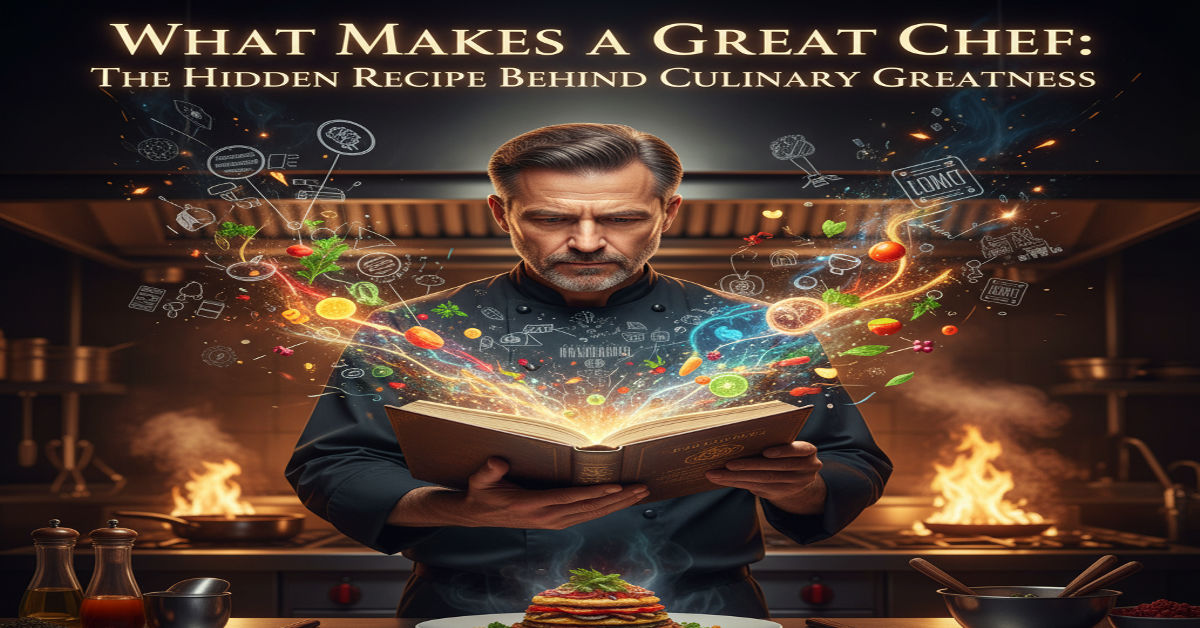Every chef begins with the same foundation a passion for food and the desire to share it with others. Yet only a few rise to the status of being called great. The path to culinary greatness is not a straight road but a demanding journey that combines artistry, resilience and leadership. Great chefs go beyond recipes. They become visionaries who create experiences that resonate deeply with those who taste their food.
The journey requires sacrifice, discipline, and the willingness to face failure and grow stronger from it. In kitchens around the world, many cooks show technical ability but what separates a great chef is the ability to inspire, innovate and build a legacy that extends beyond the plate. They are storytellers, leaders and custodians of culture who use food as their language.
The Essence of Culinary Mastery
Culinary mastery is the essence of greatness. It is not simply about preparing delicious food but about understanding flavors at their core. Great chefs can break down a dish into its smallest details while also envisioning the bigger picture. They view cooking as an ever-evolving discipline where tradition and innovation coexist.
What sets them apart is the relentless pursuit of excellence. They are never satisfied with “good enough.” Mastery means pushing boundaries, questioning existing norms, and striving for consistency at the highest level. It demands the discipline to perfect techniques while remaining open to creativity. Culinary mastery is both a science of precision and an art of expression, and great chefs find harmony between the two.
Knowledge of Ingredients and Culinary Traditions
A deep understanding of ingredients is central to what makes a chef truly great. Ingredients are more than tools; they are the heart of a dish. Chefs who understand their seasonality, origins, and cultural significance can create food that tells stories and connects with people.
They also study culinary traditions from across the globe. By honoring the wisdom of different cultures, chefs enrich their own cooking and offer menus that feel diverse yet authentic. This knowledge helps them go beyond trends, creating dishes that respect tradition while offering new interpretations.
| Ingredient Knowledge in Great Chefs | Why It Matters | Impact on Dining Experience |
| Seasonality Awareness | Brings peak flavor and freshness | Diners taste ingredients at their best |
| Global Culinary Traditions | Encourages cultural diversity | Creates menus that are authentic and varied |
| Nutritional Understanding | Balances flavor with health | Meets modern dietary expectations |
| Ingredient Storytelling | Explains origin and heritage | Builds emotional connection with diners |
A chef who knows the story of an ingredient makes it more meaningful. When guests learn that their tomatoes were grown by a local farmer or that their spices came from an ancient trade route, the dining experience transforms into something richer. Knowledge of ingredients ensures chefs can create dishes that are not only delicious but also memorable.
Developing a Refined Palate
A refined palate is one of the most critical qualities in a great chef. This ability allows them to detect subtle notes in flavor and balance tastes with precision. While anyone can taste sweet, salty, or sour, a great chef can perceive layers of complexity that others overlook.
Developing this skill requires years of experience. Chefs must taste widely, analyze differences, and refine their judgment over time. It is through constant exposure and practice that their palate becomes finely tuned. With this gift, they can ensure every dish they create feels harmonious, surprising, and perfectly balanced.
Technical Expertise and Cooking Fundamentals
Technical expertise forms the backbone of every great chef’s ability. Without a strong grasp of fundamentals, creativity has no foundation. Skills like knife techniques, sauce preparation, and heat control are essential for consistency and efficiency.
These basics are not glamorous, yet they are what guarantee that each dish reaches the table at the highest standard. Mastering the fundamentals also earns respect from the kitchen brigade. It shows that the chef has worked from the ground up and understands the discipline required to run a kitchen at a professional level.
Creativity and the Art of Innovation
Creativity turns a talented chef into a visionary. It is the power to take familiar flavors and transform them into something new and exciting. Chefs express their personality through creativity experimenting with combinations, techniques and presentations that surprise diners.
However, creativity is not about ignoring tradition. It is about respecting it while finding ways to innovate. Great chefs find harmony between old and new, using creativity to inspire diners and redefine what food can be.
| Creativity in Culinary Excellence | Examples in Practice | Result for Diners |
| Reinventing Classics | Modern twists on traditional dishes | Comfort with a sense of novelty |
| Artistic Presentation | Dishes plated like works of art | Enhances anticipation and enjoyment |
| Flavor Innovation | Combining unexpected elements | Creates memorable tastes |
| Cultural Fusion | Blending techniques from different regions | Introduces diners to new horizons |
Creativity ensures that food never becomes stagnant. A dish that surprises without overwhelming creates joy and great chefs know how to strike that balance. It is this originality that often defines their reputation and sets them apart in the culinary world.
Leadership and Kitchen Management
The kitchen is a demanding environment, and great chefs succeed because they are leaders as much as they are cooks. Leadership is about setting the tone, guiding the team, and ensuring the kitchen runs smoothly.
Chefs who lead well create respect and trust. They mentor their staff, delegate wisely, and handle pressure without losing control. Strong leadership fosters an environment where creativity and consistency thrive side by side.
| Leadership Traits in Great Chefs | Why It Matters | Result in Kitchen |
| Inspiration | Motivates team to excel | Builds loyalty and passion |
| Clear Communication | Prevents mistakes and confusion | Keeps workflow smooth |
| Humility | Creates mutual respect | Encourages collaboration |
| Composure Under Pressure | Maintains control during stress | Ensures consistent service |
The greatest chefs are remembered not just for their food but also for the teams they built. Many legendary chefs measure their success by the number of protégés who go on to achieve greatness themselves.
Communication and Team Collaboration
Communication is the glue that holds a kitchen together. Chefs must articulate instructions clearly and ensure that every member of the team understands their role. Miscommunication can lead to mistakes, delays, and unhappy guests.
Collaboration is equally essential. A chef who fosters teamwork ensures that everyone from dishwashers to sous chefs feels valued. When staff members trust and support one another, the energy translates directly into the quality of the dining experience.
Composure and Professionalism Under Pressure
Professional kitchens are high-pressure environments. Orders flood in, equipment sometimes fails, and small errors can escalate quickly. Great chefs remain composed in the face of chaos. Their calm presence reassures the team and helps them perform effectively.
Professionalism also means maintaining high standards regardless of circumstances. Chefs cannot allow stress to affect the quality of their food or the atmosphere of their kitchen. The ability to stay collected under pressure separates true leaders from the rest.
Business Acumen and Financial Understanding
Chefs who thrive long term are those who understand the business side of food. Financial knowledge allows them to design profitable menus, manage costs, and sustain their vision. Without this balance, even the most creative chef risks failure.
They also recognize the importance of branding, marketing, and building customer loyalty. A great chef not only delights with food but ensures their restaurant is financially healthy, giving their creativity a place to flourish.
| Business Acumen in Chefs | Application | Impact on Success |
| Menu Design | Balancing creativity with costs | Attracts guests while staying profitable |
| Inventory Management | Reducing waste and optimizing supply | Improves margins |
| Branding and Marketing | Creating strong identity | Builds loyal customers |
| Strategic Sourcing | Partnering with reliable suppliers | Ensures consistency |
Financial awareness is often the difference between a short-lived kitchen and a lasting culinary institution.
Organization and Time Management
Kitchens run on structure. Organization ensures that everything from ingredients to staff schedules is in order. Great chefs meticulously plan their workflow so that efficiency is maximized.
Time management is just as important. Services must run smoothly, and guests expect consistency. A chef who organizes well ensures that chaos never overwhelms their vision. This discipline creates trust within the team and loyalty among guests.
Resilience and Stamina in a Demanding Career
The life of a chef is physically and mentally exhausting. Long hours, hot kitchens, and the constant demand for perfection test endurance daily. Great chefs succeed because they possess resilience and stamina.
They approach setbacks as opportunities and push forward with determination. This perseverance not only drives their own success but also inspires their teams. In a career where many burn out resilience keeps great chefs thriving.
Customer-Centered Cooking and Hospitality
At the heart of every plate lies the guest. Great chefs know they are not cooking for themselves but for others. They think about the diner’s emotions, memories, and comfort when creating menus.
Hospitality is not just about food; it is about the overall experience. The way a dish is presented, the story behind it, and the warmth of service all contribute to lasting memories. Chefs who embrace this mindset build lasting relationships with their guests.
The Role of Humility in a Chef’s Growth
Humility grounds a chef’s success. Despite fame or recognition, the greatest chefs remain open to learning and feedback. They see themselves as part of a larger team and treat every member of their kitchen with respect.
This humility fosters growth. By acknowledging that perfection is never final, great chefs remain curious and continue evolving throughout their careers.
Lifelong Learning and Professional Development
The culinary world never stops changing. Great chefs know that learning is an ongoing process. They experiment with new techniques, study global cuisines, and adapt to trends without losing their identity.
This constant pursuit of growth keeps their food relevant and exciting. Lifelong learning also makes them better leaders, as they inspire their teams to adopt the same mindset of continuous improvement.
Culinary Trends and the Importance of Adaptation
Food culture reflects society, and chefs must adapt to remain relevant. From plant-based dining to sustainable sourcing, trends shape what people expect on their plates. Great chefs embrace these changes while maintaining their unique style.
Adaptability ensures they are never left behind. By blending tradition with modern demands, they remain innovators and leaders in a fast-evolving industry.
Balancing Art and Science in the Kitchen
Cooking is both an art and a science. The science lies in precise techniques, while the art is in creativity and presentation. Great chefs master both sides, ensuring their dishes are technically perfect yet emotionally moving.
This balance is what turns food into a cultural experience. Diners are not just nourished but inspired, reminded that food is a celebration of both craft and imagination.
The Emotional Connection Between Food and Experience
Food carries memory, emotion and meaning. Great chefs understand this connection and design dishes that evoke feelings as much as flavors. A familiar aroma can transport diners back to childhood, while a new flavor can create unforgettable excitement.
By tapping into emotion, chefs elevate dining into something deeply personal. Guests leave not just satisfied but touched by an experience they carry with them long after the meal.
Case Studies of Renowned Chefs Worldwide
The journeys of celebrated chefs highlight the traits of greatness. Julia Child introduced French cuisine to American homes with humility and passion. Gordon Ramsay built a global empire through discipline and leadership. Massimo Bottura reinvented Italian classics with bold creativity. Dominique Crenn became the first woman in America to earn three Michelin stars by combining artistry with resilience.
These examples show that while each chef’s path is different, the qualities that define greatness remain universal. Technical skill, creativity, leadership and passion are the threads that connect them all.
Conclusion and Final Thoughts
Great chefs embody passion, skill, resilience and leadership. They transform food into art, kitchens into communities, and meals into experiences. Their greatness comes from the way they balance tradition and innovation, humility and ambition, creativity and discipline.
The path to becoming a great chef is challenging, yet it is also rewarding. A great chef does not just feed people but inspires them, leaving behind a legacy that lives far beyond the kitchen.
Frequently Asked Questions
1. What makes a great chef different from a good cook ?
A good cook can prepare delicious food, but a great chef inspires through leadership, vision, and the ability to create experiences beyond the plate.
2. How long does it take to become a great chef ?
There is no set timeline. Many chefs spend years or even decades honing their craft before reaching recognition.
3. Do you need formal training to be a great chef ?
Not always culinary school is valuable but many great chefs learned through apprenticeships, mentorship, and self-study.
4. Is creativity more important than technique ?
Both matter equally. Technique ensures consistency while creativity allows originality. Great chefs balance the two.
5. Can someone be a great chef without owning a restaurant ?
Yes chefs can achieve greatness through catering, teaching, writing, or private dining. Greatness is measured by impact, not ownership.







